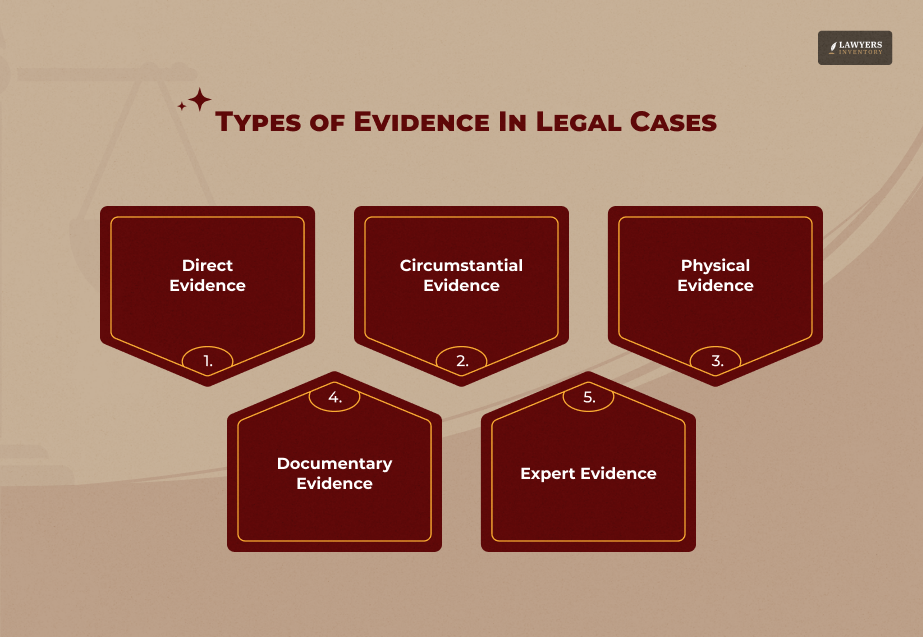
When you’re worried about the outcome of a legal case, the most vital factor is proving what really occurred. You see, the court doesn’t just take a person’s word for it. You need substantial proof. And that is why understanding the types of evidence is important!
In case you did not know, each of these performs a unique role in a case. Whether you are in a criminal or in a civil case, evidence allows the choose or jury to determine what is really the matter.
And there are several reasons why understanding evidence is important. But most importantly, it can have an effect on the final results of a case.
For example, in case you are wrongly accused of a criminal offense, strong proof can prove your innocence.
On the other hand, if you are attempting to show that someone harmed you, the right proof allows you to get justice.
Hi. In today’s blog, I will explain the different types of evidence and how they can affect your case. Knowing your rights and how evidence works can help you navigate the legal system more confidently.
Evidence and Its Role in Legal Cases
In a court case, evidence is basically anything that is relevant to establishing or defending a claim. This is the basis for the evidence that both parties present to forward their respective sides of the story.
Without evidence, the court has no ability to determine who is telling the truth. For instance, if a person alleges that they were at home when someone committed a crime, but the security camera shows otherwise, that physical evidence can serve to show the person was lying.
Alternatively, if someone signed a statement that said they were at home at the time of the crime, that statement can serve as evidence to support their claim of innocence.
Having evidence is important because it contributes to fairness. Courts will use them in a trial to make sure that the guilty are made to pay for their crimes and that innocent people do not suffer wrongful convictions.
In a civil case, evidence helps determine whether someone will pay money for damages. In a criminal case, evidence can help determine whether someone goes to jail or walks free.
Knowing evidence is an important part of knowing one’s rights and knowing what justice has been served.
Types of Evidence: Know All Types & How They Affect Your Case

Now that you are aware of what evidence is and why they are so important in a legal case, let me tell you about the different types of evidence.
Yes, there are several forms of proof that can impact the potential outcome of your legal case. While some directly show how they impact your case, others might need to have a logical conclusion.
So, here are the different types of evidence and how they can have an impact on your legal case:
Direct Evidence
First on the list is direct evidence. And TBH, it is a type of evidence that is the simplest of all.
Direct evidence connects someone to an event without needing one to consider anything more complex.
If someone witnesses a crime, the witness’s testimony is direct evidence. If video evidence captured the crime being committed, that is also direct evidence of the event.
For example, let’s say that you are someone who is facing charges and accusations of breaking a window, but a neighbor witnessed someone else breaking the window. The neighbor’s testimony could help in your exception.
Additionally, if surveillance video captured the act of someone else breaking a window, the video would further serve as direct evidence that the neighbor was witness to the act.
How does that affect a case? Direct evidence is often more noteworthy evidence, primarily because the evidence has been perceived as needing less consideration into what was observed.
If the witness proved to be credible for a crime or event, the testimony likely carries a heavy consideration. Credibility is essential. If the witness lay or attention was unobservant, the evidence will have far less weight.
Circumstantial Evidence
Secondly, there’s circumstantial evidence. This does not directly show or prove some thing. However, it helps in forming a reasonable end to the case. In a way, it is like solving a puzzle. Each piece gives clue that makes the bigger picture clear.
For instance, assume a person is facing charges of theft, and the investigators find out their fingerprints at the crime scene. While the prints do not directly prove anything, it suggests that they have been there.
In another case, let us imagine that a person was see walking away from a crime scene. While that does not directly prove that they are the ones commistting the crime, it signal that the person might be associated with it.
But how does it affect or determine the outcome of a case? Let me tell you!
These evidences will become a powerful when other evidences come together to make the picture more cohesive. However, it isn’t as strong as direct evidence as it calls for interpretation.
Physical Evidence
Physical evidence refers to any physical object presented in court to support or prove a fact of a case. This includes the following:
- Weapons or instruments used in a crime.
- Blood or DNA gathered from a crime scene.
- Shoe prints or fibers from the clothes worn by suspects or witnesses.
- Drugs or stolen merchandise found on a suspect.
Previously stolen merchandise located in someone’s home can be supporting evidence that they were involved in the theft.
A murder weapon with a suspect’s fingerprints can incriminate them to the crime. Physical evidence often has significant power simply because it’s often hard to argue against it. Physical objects are often undeniable, unlike a witness who can lie or forget.
But we must remember that physical evidence only has the power we give it during the process of collection and analysis.
Even physical evidence can lose its strength if someone tampers with it or bottles it. If people store evidence at a crime scene in very cold temperatures for too long, the liquids that need to be preserved evaporate, which removes pieces of key evidence that could be helpful in a case.
Documentary Evidence
Written or digital records that support a claim constitute documentary evidence. Examples include:
- Contracts establish agreements
- Emails or texts show conversations between parties
- Bank statements track money transacted
- Medical records verify injuries
For example, if a person refuses to pay for services rendered to them, a signed contract would serve to prove that they even agreed to it. An email would serve strong court evidence if police catches a person incriminating themselves.
Documentary evidence is oftentimes very credible because of its recorded nature; however, the main substance of evidence is its authenticity.
A single forged document can completely destroy the interests of the truthful party. Hence, once someone presents the evidence in court, experts sometimes have to check the authenticity before accepting it.
Expert Evidence
In court, professionals give expert opinions with special knowledge of the subject matter. These experts evaluate the information available and ultimately draw conclusions to assist the court in comprehending complex matters.
Some common examples of expert witnesses include:
- Doctors can provide information about medical injuries
- Forensics can analyze crime scene evidence
- Financial experts can investigate matters of fraud
- Psychology can assess an individual’s state of mind
For example, a doctor may explain in a medical malpractice case whether or not the patient considered the wrong treatment. In a criminal case, investigators use forensic evidence to match any DNA against that of the suspect.
The expert evidence, therefore, carries much weight, since it consists of people who have studied in greater detail on the subject matter.
At the same time, the experts must be impartial and state facts rather than opinions based on vested interests.
When there exist differences between the two expert witnesses, the court will be tasked with ascertaining which expert is deserving of credence.
Understanding the Laws of Evidence
In conclusion, when it comes to evidence, it is basically the foundation for any kind of legal case. It is the primary thing that helps decide the right and the wrong in a case.
That is the reason why it is so very important for everyone to know about the different types of evidence in a legal case.
In the event that you face an accusation for something you did not do, having an idea about how evidence works can assist with your defense in a legal process.
If you are the victim and are seeking justice, having good and credible evidence will support your claim of wrongdoing.
The legal system is set up to be just. And evidence, when people use it correctly, assures that court makes decisions based on what really happened and not through a person’s opinion.
Whether you are dealing with direct, circumstantial, physical, documentary, or expert evidence, each gives invaluable support for proving what actually happened.
Understanding the laws of evidence engages your ability to make well-informed decisions and preserve your rights in any legal proceeding.
Read Also:
- How to Gather Strong Medical Evidence for a Disability Claim
- How Construction Expert Witnesses Influence Court Decisions
- Evading Arrest Or Detention: Potential Legal Consequences and Penalties Under the Texas Penal Code











0 Reply
No comments yet.